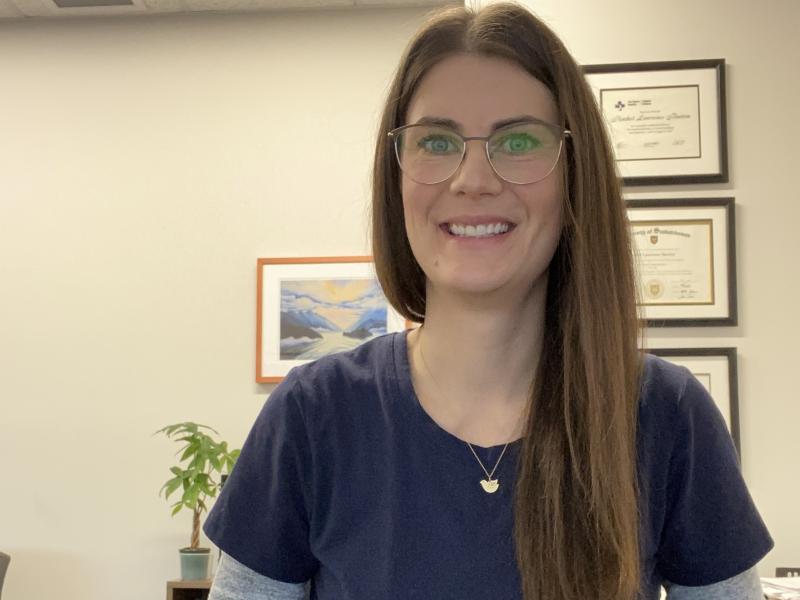Rachel Burton Career Spotlight
Rachel Burton is a clinical psychologist currently practicing with the Saskatchewan Health Authority.
What area of health-care do you work in and where do you work?
"I am a psychologist specialized in the areas of clinical and health psychology. I currently work with an interdisciplinary team of psychologists, psychiatrists, an occupational therapist, a social worker, a family doctor and administrative staff at the Operational Stress Injury (OSI) clinic in Saskatoon. OSI clinics are funded by Veterans Affairs Canada and there are a series of clinics operating across the country. These clinics provide services to Canadian Armed Forces (CAF) members, Royal Canadian Mounted Police (RCMP) members and veterans of both organizations."
What are you responsible for as Psychologist? Please describe a typical day for yourself.
"As a clinical psychologist, I provide psychological assessments and therapy to adults. Clients are referred to the OSI clinic through the RCMP or Veterans Affairs Canada due to an Operational Stress Injury (OSI) which is psychological concern that is directly related to a member’s service. Conducting psychological assessments is a large part of my job. When clients do have an OSI then they are able to access different treatment options, including therapy, at the clinic. The most common presenting concern for clients at the OSI clinic is Post-Traumatic Stress Disorder (PTSD) but we also see people with concerns including depression, anxiety, anger, disturbed sleep, and relationship problems. Another thing I do is I supervise practicum students and psychology residents.
A typical day for me may look like an initial consult with a client in the morning, followed by a team meeting with our staff, therapy sessions with clients in the afternoon and a supervision meeting with a student or resident."
How is your work-life balance as a Psychologist?
"Working in the OSI clinic, my work-life balance is good as we work regular day-time office hours 8:00 AM – 4:30pm, Monday to Friday. I do not work in shifts, evenings or weekends which is great. Before joining the OSI clinic, I worked at an outpatient mental health clinic in Prince Albert and before that I was a psychology resident at the Ottawa Hospital."
Have you always wanted to be a Psychologist? Please provide more details regarding your career path to becoming a Psychologist.
"When I started university, I was not sure what I wanted to do. I knew I was interested in health-care and helping people so I took a psychology class as an elective in my first year at the University of Alberta. I really enjoyed it so I started to take more related courses. The University of Alberta has a unique psychology undergraduate program because there is an opportunity to do an internship which I took advantage of and got the opportunity to work directly with a psychologist at a chronic pain clinic in Edmonton. Working at the clinic was my first health-care setting experience and it helped me make the decision to go to graduate school.
I completed my Doctor of Philosophy (Ph.D.) in Clinical Psychology at the University of Saskatchewan. As part of my Ph.D., I was eligible to apply for a psychology residency program in Canada where I matched with the Ottawa Hospital. During my residency, I completed rotations in clinical, health, and rehabilitation psychology. After completing my residency in Ottawa, I joined the Saskatchewan Health Authority as a provisionally registered psychologist. I then defended my dissertation and wrote the Examination for Professional Practice of Psychology (EPPP), which is a national examination, required to obtain a license to practice as a Psychologist in Saskatchewan."
Are there opportunities to further your career as a Psychologist with the Saskatchewan Health Authority (SHA)?
"Yes there is! Psychologists work in many different programs within the SHA so there are opportunities to move into different areas to grow and use different skill sets. For example, I started my career with Mental Health Outpatient Services in Prince Albert and then moved to the specialized OSI clinic in Saskatoon. There are also Senior Psychologist positions where, in addition to clinical work, you are able work on new program development and operational tasks such as managing and supporting staff. There are also professional development opportunities such as educational conferences."
What is one of the biggest advantages of practicing as a Psychologist with the Saskatchewan Health Authority?
"One of the biggest advantages is having psychologist colleagues and other team members as a direct support network. Practicing as a psychologist can be tiring and emotionally taxing at times so it is valuable having close supports and strong colleagues. I think I would miss this level of support and the interdisciplinary team if I worked independently in a private practice setting."
Do you have any advice for students or new graduates looking to pursue a career as a Psychologist? Are there specialty areas that are in demand more than others?
"Psychologists and all specialties are in demand everywhere given the high level of requirements in order to obtain a license to practice.
For undergraduate students looking to follow this pathway, I recommend seeking out opportunities for research such as an honours program or even a specific class to build your research skills. Psychologists are trained as scientists as well as clinicians which makes us really unique as a health-care profession. Also make sure that the graduate program you are looking at applying for is accredited by the Canadian Psychological Association.
For Ph.D. students, there are so many areas of practice within Psychology and if you are not sure what area you want to work in, try out practicums in different settings as early as you can."
What is the number one thing you love about being a Psychologist?
"I love when my clients get better. There is nothing better than seeing a client successfully complete their treatment, meet their goals for therapy, and feel better. A close second is working directly with students and residents as I enjoy teaching and watching them develop their skills and confidence to start practicing on their own upon completing their residency. Finally, I enjoy working with psychologist colleagues and other disciplines as providing the best health-care involves many different areas of expertise."




